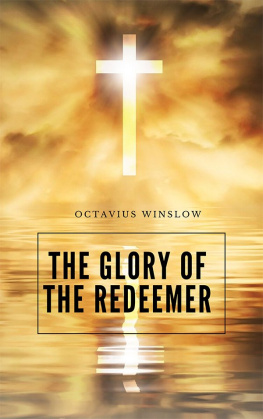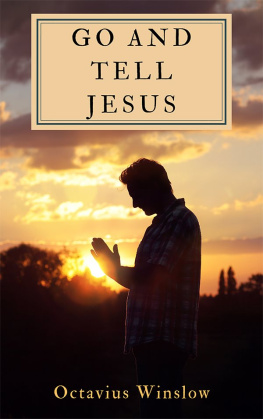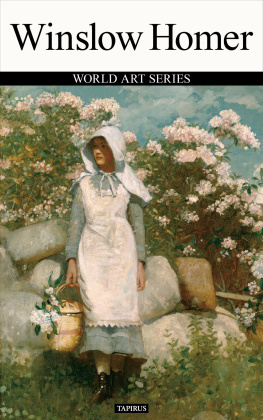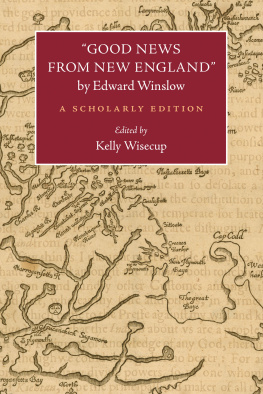PREFACE
Octavius Winslow (1 August 1808 5 March 1878), also known as "The Pilgrim's Companion", was a prominent 19th-century evangelical preacher in England and America. A Baptist minister for most of his life and contemporary of Charles Spurgeon and J. C. Ryle, he seceded to the Anglican church in his last decade.
Octavius's mother, Mary Forbes (1774 1854) had Scottish roots but was born and raised in Bermuda and was the only child of Dr. and Mrs George Forbes. On 6 September 1791, when she was just 17, she married Army Lieutenant Thomas Winslow of the 47th Regiment. Shortly after this, she came under spiritual convictions and was brought to gospel deliverance while pleading the promise, Ask, and ye shall receive
Mary and Thomas Winslow went on to live in England and Octavius was born in Pentonville, a village near London, on 1 August 1808. He was the eighth of 13 children. Those children recorded in the family bible of Robert Winslow, brother of Octavius, are:
Thomas Forbes (1795)
Isaac Deblois (1799)
Edward (1801)
George Erving (1804)
Henry James (1806)
Robert Forbes (1807)
Octavius (1808,
Forbes (1810)
Emma (1813)
Mary (1814)
Thomas and Mary had three children who died before their first birthday. They are:
Mary (1814)
Robert Deblois (1798)
Mary Elizabeth (1803).
Octavius seems to have been given his name because he was then the eighth surviving child.
As a child, Octavius and family would worship at Pentonville Chapel under the ministry of Rev. Thomas Sheppard. During this time of his life, he suffered from what seemed to be a life-threatening illness. While staying in Twickenham, a nurse accidentally administered an incorrect medicine that doctors would later say would have killed ten men. Octavius's father was from a wealthy family but by 1815, following his retirement from the army, he suffered ill health and the loss of his fortune due to one of several national financial disasters that occurred in this period. A decision was soon made to move to America, but before Mr. Winslow could join his wife and children in New York, he died. At the same time, their youngest child died too. Octavius was but 7 years old.
Widowed at 40, responsible for a large family, and scarcely settled in America, Mrs Winslow's entire life was turned upside down. Worst of all, spiritual darkness and despondency overwhelmed her for many months.
They were a deeply religious family and Octavius later wrote a book about their experiences from his mother's perspective in a book entitled Life in Jesus.
Family historian D. Kenelm Winslow recorded their plight:
Mary had the youngsters out on the streets of New York selling matches and newspapers as soon as they were old enough for such tasks. She set them to any job they could tackle, gathering them around her at night for scripture reading followed by a good sound evangelical harangue and prayers.
Mary and her children lived in New York City until 1820. Then, after a four-month visit back to England, they would then move to Sing Sing, NY on the Hudson River for "four years of congenial repose". In 1824, they would move back to New York City for a season of "special revival" where brothers Octavius, Isaac, and George would become converted and later convinced of God's calling to ministry.
Winslow was saved under the ministry of Samuel Eastman, pastor of Stanton Street Baptist Church in New York City. On Wednesday, 11 April 1827, Octavius shared his testimony and professed his faith in his Savior. He would later be baptized in the Hudson River on the Lord's Day of 6 May at 4pm. Mary would later pen this:
My children are earnestly engaged in bringing sinners where the Holy Ghost is displaying His mighty power. They visit from house to house, dealing faithfully with all they meet who know not God.
CHAPTER 1
THE GLORY OF THE REDEEMER
"The Redeemer, the Revelation of the Father's Glory"
"The glory of God in the face of Jesus Christ." 2 Cor. 4:6
That God was under any obligation or necessity to reveal Himself to man, is an idea that cannot for a moment be seriously entertained. It will follow, then, that such a revelation of Himself, of His mind and will, to fallen creatures having been made, it must be regarded as astounding act of His sovereign mercy, irrespective of any claim whatever arising from the creature man. The source where it originates must be entirely within God Himself. The great point which now lies before us bears upon the mode of the Divine revelation; and resolves itself into the single and important inquiryWhat forms the most perfect revelation of the glory of God to man? It is the design of this chapter, in humbly attempting an answer to this question, to show that the only full and perfect revelation of the glory of God is seen in the Lord Jesus; that apart from a spiritual and experimental knowledge of the Son there can be no true, adequate, and saving knowledge of the Father. To clear up this momentous matter the more thoroughly, it will be proper that we first demonstrate THE UTTER IMPOSSIBILITY OF A CORRECT KNOWLEDGE OF GOD OUTSIDE OF CHRIST; this will have prepared us for a more full consideration of our main subject.
The most palpable evidence and fearful result of man's fall from original holiness is the deep and awful ignorance of God, of His character, perfections, and moral government, in which that apostasy has involved him. It was the glory and the happiness of Adam that, before his revolt, not a cloud rested upon his mind tending to obscure the most clear and perfect views of the Divine character which it was possible for a finite creature to possess. He knew God sufficiently for all the purposes of a life wholly conformed to His will, and supremely devoted to His glory. There was no intellectual darkness in his understanding, no moral corruption of his will, nor of his affections. The whole soul constituted as it were an orb of the most beauteous light, kindled by God Himself, and reflecting its beams of beauty on every object in nature. It is true that, regarding his knowledge of God, nature was his teacher, or rather the medium through which he was taught; that impressions and perceptions of the Divine existence and glory were received mainly through the imagery of sensible objects; that the "invisible things of God were clearly seen, being understood by the things that are made, even His eternal power and Godhead." Yet this affords no solid argument in favor of a perfect knowledge of God in nature; for let it be remembered that nature, as a mirror of the Divine glory, was framed for man as innocent, and not for man as guilty; that when by his own act this mirror was defaced and destroyed, with it was destroyed all true natural knowledge of Jehovah. Had the creature continued in his state of perfect rectitude, then no other revelation of God would have been needed; but throwing around him the pall of guilt, he necessarily threw around him the pall of ignorance. And before there can be clear and perfect light in the soul of the character and perfections of God, there must be a removal of that sin which else must eternally separate God and man. Hence the absolute necessity of just such a revelation of the Father as Jesus, the "true Light, which enlightens every man that comes into the world."
The most difficult, perhaps, because the most humbling lesson which the world has ever had to learn, has been the nothingness of its own wisdom, and the folly of its unaided endeavors to find out God to perfection. Earnest as have been its desires, ardent as have been its aspirations, and laborious as have been its endeavors, the "unknown God" is the only inscription written upon its altars. The ancient philosophers prided themselves on their superior attainments in this study; but to what did their knowledge of God, underived from revelation, amount? What was the actual result of their profound researches, patient inquiries, acute reasonings, and subtle disputations? Let the apostle reply: "Professing themselves to be wise men, they became fools." Even worse than this. Not only "by wisdom the world knew not God," but the imperfect knowledge it did gather of Him in nature, so far from expanding their mental conceptions of the Divine character, and elevating their lives to a conformity to the Divine will, seemed but to lead them into the deepest and grossest idolatry! "Professing themselves to be wise men, they became fools, and changed the glory of the incorruptible God into an image made like to corruptible man, and to birds, and four footed beasts, and creeping things." What an affecting picture! Oh that the proud eulogist of the dignity of human nature would study it! What an instructive lesson! Oh that the vain seeker of God outside of Christ would learn it! Here was the world, at an age when civilization and philosophy, poetry and the arts, flourished in a pre-eminent degree, and were exerting a softening and ameliorating influence upon society, yet utterly abandoned to superstition and idolatry. Idolatry in its darkest clouds was settling upon its moral landscape; idolatry in its gloomiest attributes was entwined with its history; idolatry in its grossest features was blended with its literature; idolatry in its most insinuating forms was advanced with the creations of its poetic genius; idolatry of the most degrading and sensual kind, was enthroned in the seats of its philosophers, was dignified by their approval, inculcated in their lectures, and sanctioned by their example. The histories of Egypt, of Greece, and of Rome, testify that "the world by its wisdom knew not God,"that after every expedient had been adopted, and every experiment had been triedafter the triumphs of war, and the arts of peace, and the wisdom of legislation, and the lessons of philosophy, and the inculcations of religion, had done their utmost, man was still left ignorant of God, and consequently steeped in guilt, and bowed in grief, the slave of every vice, and the sport of every sorrow. Thus did God "destroy the wisdom of the wise, and bring to no thing the understanding of the prudent." And thus, too, will He ever confound the wisdom and abase the pride of that man, who, towering on the Babel of his own unassisted research, would find Him out to perfection who is the "blessed and only Potentate, the King of kings, and Lord of lords; who only has immortality, dwelling in the light which no man can approach unto; whom no man has seen, nor can see." But we proceed to the main subject or this chapter, which is to set forth the Lord Jesus in His person and work as constituting the only true and perfect revelation of God to man. The great and precious truth we are now to contemplate is introduced to us in these words of the inspired Evangelist: "No man has seen God at any time; the only begotten Son, who is in the bosom of the Father, He has declared him." Of the vast importance of a correct knowledge of God, need we speak at length? It is a truth which finds an assent in well-near every judgment. Every awakened conscience desires it; every believing mind admits it; every tried soul feels it. It lies at the basis of salvation; it forms the material of happiness; it supplies the true motive to holiness; it is the groundwork and the prelude of future and eternal glory.












